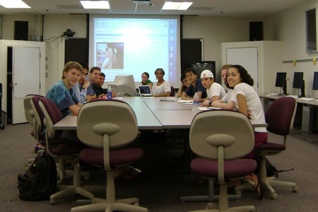Prior to Cornell
 Prior to Cornell, between 1984 - 2005, my teaching experience was varied and centered in a number of institutions in the Caribbean and Britain where I received my masters and doctorate degrees. While in Jamaica, I taught courses in Critical Analysis and Contemporary Jamaican Art at what was then called the Jamaica School of Art and returned there after 20 years to the newly named Edna College of Visual and Performing Arts as Head of Art History with specific responsibility for designing the Caribbean's first bachelors degree in that discipline. This program is currently being implemented. While at the College, I also designed and developed the Caribbean Artists Archive a database of more than fifty artists from the region and ran a program of exhibitions as curator of the College Art Gallery. the cag[e] (see: Curatorial Practice). In Britain, my teaching was equally diverse, beginning initial at Cheltenham Art College where over a period of six years 1988-1994, I taught a range of contemporary courses under the general subject heading of Critical Studies. While completing graduate studies in France, I taught Modern Art History: From Impressionism to Abstraction at the Lacoste Institute's School For the Arts in France (1991) and on completion of my doctoral studies program in 1994, I was invited to stay on to teach at my home institution the Courtauld Institute. My course entitled Ideas of the Primitive in addition to another similar course on modernism in the Courtauld's summer session entitled Going Native, ran for two years until my departure for the Caribbean in 1997 .
Prior to Cornell, between 1984 - 2005, my teaching experience was varied and centered in a number of institutions in the Caribbean and Britain where I received my masters and doctorate degrees. While in Jamaica, I taught courses in Critical Analysis and Contemporary Jamaican Art at what was then called the Jamaica School of Art and returned there after 20 years to the newly named Edna College of Visual and Performing Arts as Head of Art History with specific responsibility for designing the Caribbean's first bachelors degree in that discipline. This program is currently being implemented. While at the College, I also designed and developed the Caribbean Artists Archive a database of more than fifty artists from the region and ran a program of exhibitions as curator of the College Art Gallery. the cag[e] (see: Curatorial Practice). In Britain, my teaching was equally diverse, beginning initial at Cheltenham Art College where over a period of six years 1988-1994, I taught a range of contemporary courses under the general subject heading of Critical Studies. While completing graduate studies in France, I taught Modern Art History: From Impressionism to Abstraction at the Lacoste Institute's School For the Arts in France (1991) and on completion of my doctoral studies program in 1994, I was invited to stay on to teach at my home institution the Courtauld Institute. My course entitled Ideas of the Primitive in addition to another similar course on modernism in the Courtauld's summer session entitled Going Native, ran for two years until my departure for the Caribbean in 1997 .
At Cornell
My teaching record with Cornell continues to grow and in the past few years I have established a range of courses related to the Africa, the Diaspora and the Caribbeanl. I am teaching three courses currently. Race, Rasta and Resistance, (ARTH425; AS&RC426), is fashioned out of my research while at the Society For The Humanities and explores the artistic imagery and the social milieu that fostered the Rastafari movement. Contemporary African Diaspora Art is a course initiated by Prof. Cheryl Finley that I have adapted to incorporate greater use of on line resources and my Diaspora Dialogs website that represents an attempt to initiate and maintain a conversation about artistic practice amongst artists scattered around the globe. That dispersal has come to be labeled as a 'diaspora' a term originally exclusive to Jews but in the last century used increasingly with reference to the new world experience of blacks in post-slavery and more recently post-colonial communities. Diaspora dialogs attempts a conversation between such scattered voices in real time as a way of articulating, defining and exploring how the experience of cultural dislocation has impacted cultural production. Initially, Diaspora Dialogs is set up as a teaching tool aimed specifically at disseminating information amongst a small group of engaged students. It is their ideas and responses to artists, images, and selected texts that will populate the site. Each week, an 'editorial' is posted, to which students respond through the use of a 'web log', over a period of once semester. In turn, artists are invited to view and participate in the conversations they establish by making contributions about their thoughts and work. It is hoped that dialogs established now will be maintained as an on-going conversation even after the initial semester's teaching is over.
Diaspora Dialogs is a pilot project that explores the possibility of distance learning for students of art history normally removed from sites of artistic productivity. Their engagement with artists exploits available technology in a manner more usually equated with their leisure time and 'blogging' as opposed to their studies. Diaspora dialogs tries to bridge such informal and formal modes of study by providing a learning experience that is both integrated and dynamic. My interest in the Diaspora has funnelled easily into my most recent course offer, Caribbean Dialogs (ARTH 4526) that establishes a conversation between students with the artists and culture of the region. This course web 2.0 technology to ensure dynamic delivery.